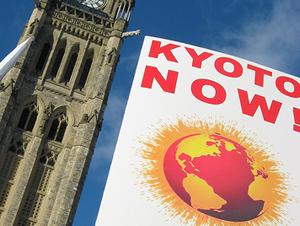Obstacles stand in the way of new climate treaty
Sign at climate change rally in Ottawa, February 2009. (Image: Flickr user Peter Blanchard (CC BY-SA 2.0))
There’s a blizzard of climate change summits scheduled: New York, Pittsburg, Bangkok, Barcelona — all opportunities to reach agreement on a new treaty; but the climate remains uncertain for a deal. The United States has yet to match the emissions cuts promised by the Europeans and the Japanese.
And developing countries are still waiting for help from the richest nations to cut emissions and adapt to climate disruption. The U.S. and China together account for more than 40 percent of global warming gases, and the two have been negotiating extensively about how they might partner to move forward.
“The thing to note is that the U.S. and this new administration is actually pursuing climate change on a number of different fronts,” said Jennifer Morgan, director of the Climate and Energy Program for the World Resources Institute in Washington D.C.
“They’re engaged in the UN negotiations, they’ve started this major economies forum where they’re bringing the major economies together, and they’re pursuing their bilateral relationships — a very important one — which is with China.
“And, there, the administration is exploring with China, some initiatives around things like energy efficiency, renewable energy, carbon capture and storage to really build the partnership that’s going to be needed by these two major economies to decarbonize, and to build some trust and some confidence both in China that the U.S. is really moving, and of course in the U.S. that China is really moving.”
Morgan believes a good first step for the US and China would be a partnership to accomplish a concrete goal, whether it be in developing energy efficient buildings or exploring solar technology.
“I think the other thing that would be very helpful is if both countries worked on how they’re gonna measure, report, and verify their emissions,” she adds. “What systems of transparency are they going to set up, and to really start building the capacity in China to do that kind of measuring, reporting, and verification, and the U.S. has obvious experience in this. So, those two areas, I think, are kind of the foundation, but also really looking transformationally how we’re going to decarbonize these two economies, which, you know, starts in Copenhagen, but is a way, much longer process to get there.”
In the context of these negotiations with China, a row has erupted over tariffs the U.S. is going to impose — a tire tariff. This comes just at the moment the U.S. is trying to come together with China on a bilateral agreement around climate. Some might say that there might be domestic factors in both countries that might see it in their interest to have talks fall apart on the issue of trade.
And then there’s Japan: the world’s second-largest economy. Its incoming prime minister says that he now wants to cut emissions by 25 percent over 1990 levels over the next ten years. Of course the condition is if only other developed countries set similar ambitious goals.
Morgan says this is a significant shift in Japan’s stance on carbon emissions, which sets precedence for other countries, “Australia and the European Union have also said is, okay, we’ll only go so far domestically, but if we get a global deal, if we get an agreement, where other industrialized countries are ready to take on ambitious targets, and developing countries are ready to take on ambitious actions, we’re ready to go further.
“Japan is highly efficient, the export potentials could be large for such a nation, and, you know, they’ve got the systems in place. And China, of course, is a key one for them, as well. They’ve got lots of bilateral relationships going there. So, I hope that Japan can provide some inspiration.”
Getting developing countries to come to agreement is another obstacle. Last month a group of African countries said it would need 60 to 70 billion dollars a year to help deal with the effects of climate change. And recently, the prime minister of Ethiopia insisted that Africa will not go along with the treaty unless the developed world responds.
Morgan says the impact of climate change on Africa is life-threatening, therefore, they are justified in asking for developed countries to step up:
“I think it’s completely understandable for Ethiopia and others to be raising the red flag, and saying ‘this is … not just our economic wellbeing, it’s about our health; it’s about … the additional impacts of climate change — further droughts, food security issues’ …
“And we need developed countries to deliver. I, you know, I think if they don’t deliver there will not be an agreement at the end of the day. But they need to also see that developing countries are coming forward and taking actions and with that funding, you know, we’re gonna make that shift to that low-carbon economy.”
Hosted by Steve Curwood, “Living on Earth” is an award-winning environmental news program that delves into the leading issues affecting the world we inhabit. More “Living on Earth.”
Every day, reporters and producers at The World are hard at work bringing you human-centered news from across the globe. But we can’t do it without you. We need your support to ensure we can continue this work for another year.
Make a gift today, and you’ll help us unlock a matching gift of $67,000!
